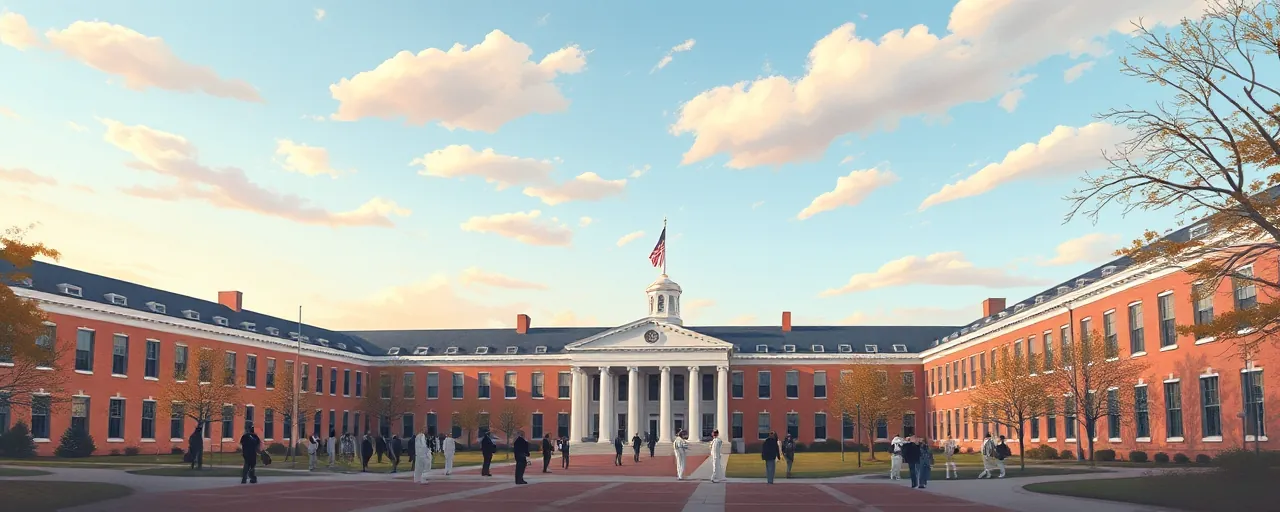A Warm Welcome in Annapolis
The U.S. Naval Academy buzzed with energy on April 1, 2025, as Defense Secretary Pete Hegseth stepped into King Hall to join midshipmen for their noon meal. Greeted by a wave of applause, he moved through the crowd, shaking hands and exchanging quick words before taking the podium. His visit, a blend of formality and candid connection, set the stage for a day that would leave an impression on the brigade.
Hegseth’s stop at Annapolis was more than a ceremonial drop-in. With midshipmen poised to become the Navy and Marine Corps’ next leaders, his presence offered a rare chance to hear directly from the Pentagon’s top official. The day unfolded with personal stories, pointed questions, and a focus on what it takes to lead in a world of shifting threats.
Athletics as a Forge for Leadership
After lunch, Hegseth sat down with team captains, drawing from his own days on Princeton’s basketball bench to connect with their grind. He spoke to Navy Midshipman 1st Class Joshua McGill, brigade commander and rowing team captain, who brings years of enlisted service into his role. McGill shared how his time aboard ships like the USS Bonhomme Richard taught him grit, a quality he now leans on to guide his peers. Their chat touched on an upcoming rowing trip to Japan, a nod to the academy’s global reach.
Navy Midshipman 1st Class Lysander Rhenstrom, basketball captain, traced his path from online classes during the pandemic to the academy’s full-on commitment. Set to join the Marine Corps, he told Hegseth the shift felt like a calling, sparked by his father’s blunt advice to seize the opportunity. Meanwhile, boxing captain Nick Smith, from a family with deep military roots, spoke of discipline honed in the ring and a legacy he’s proud to carry forward. These exchanges underscored a truth long recognized at military academies: sports sharpen the skills leaders need, from teamwork to quick thinking under fire.
Facing the Future’s Tough Questions
The day peaked in Alumni Hall, where midshipmen fired off questions that cut to the heart of today’s challenges. Jack Grygiel, a history major, pressed Hegseth on long-term strategy against China’s rising power. Hegseth pointed to economics, energy, and alliances as pillars for keeping America ahead, framing it as a handover to the next generation of leaders. The U.S. faces a China pumping $249 billion into its military this year alone, building stealth jets and a sprawling navy, all while tensions simmer over Taiwan and the South China Sea.
Luc Gregoire, an aerospace engineering student, zeroed in on cyber threats, a domain where AI and quantum tech are rewriting the rules. Hegseth stressed weaving cyber into every layer of military planning, a nod to a world where digital strikes can cripple grids or supply lines without a shot fired. Then Sergio Santander, echoing the motto ‘If you want peace, prepare for war,’ asked what habits matter most. Hegseth urged mastery of their craft and a grounding in integrity, hinting at the moral backbone he sees as vital. Garrett Crowder rounded it out, probing what sets American warriors apart. Hegseth credited the NCO corps, a decentralized edge over rigid, top-down foes like China.
Balancing the Big Picture
Hegseth’s answers reflect a Pentagon wrestling with a complex landscape. China’s military push, rooted in decades of plans like ‘Made in China 2025,’ pairs cutting-edge tech with a navy now outnumbering any other. The U.S. counters with a ‘strategy of denial,’ leaning on allies like Japan and forward bases to check Beijing’s reach. Yet, budget strains and aging systems raise questions about readiness for a drawn-out fight. On cyber, experts warn the race for quantum-resistant defenses lags behind threats, with state-backed hackers already testing U.S. infrastructure.
Voices outside the military offer a wider lens. Economists note China’s defense spending, though rising, stays lean relative to its economy, signaling discipline that contrasts with America’s broader outlays. Tech analysts highlight the cyber gap, where global teamwork falters amid distrust. For midshipmen, these stakes aren’t abstract; they’re the reality they’ll inherit, shaped by family legacies, academy rigor, and the leaders they meet along the way.
A Day That Sticks
Hegseth’s visit left midshipmen with more than a pep talk. It was a glimpse into the weight of their future, from rowing in Japan to facing cyber strikes or a rival superpower. McGill, Rhenstrom, and Smith each walked away with a sense of purpose tied to their own journeys, whether forged in the fleet, sparked by a parent’s nudge, or carved from a family tradition. Grygiel and others got a taste of the strategic chess game they’ll soon play a part in.
As the brigade dispersed, the echoes of Hegseth’s words lingered: know your craft, lead with integrity, push decisions down the chain. It’s a charge that blends the academy’s old-school ethos with the demands of a world tilting toward digital battlefields and global rivalries. For these future officers, the path ahead is daunting but clear, and days like this sharpen their resolve to meet it head-on.
